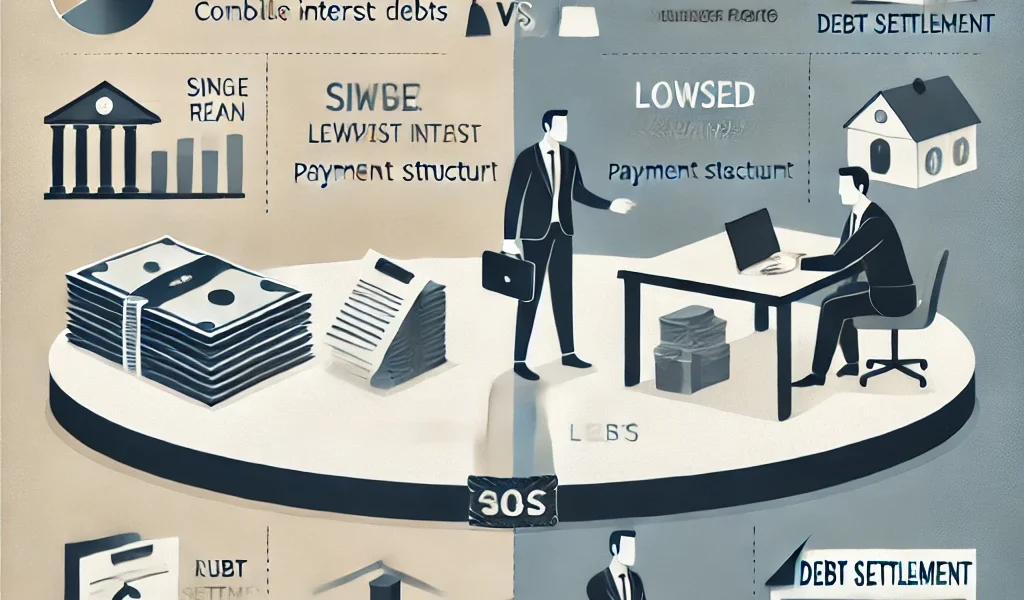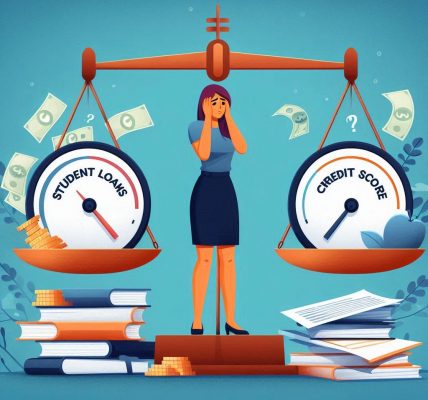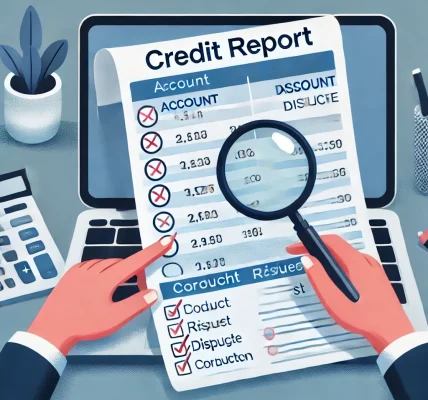Managing debt can be overwhelming, especially when multiple loans or credit card balances pile up. If you’re struggling to make payments, you may be considering debt consolidation or debt settlement as potential solutions. While both options can help you regain control of your finances, they work in very different ways.
This guide will break down the key differences, advantages, and risks associated with both debt consolidation and debt settlement so you can make an informed decision that best suits your financial situation.
Understanding Debt Consolidation
Debt consolidation is a financial strategy that combines multiple debts into a single loan with a lower interest rate. This simplifies payments and can reduce overall costs.
How It Works:
- You take out a personal loan, balance transfer credit card, or home equity loan to pay off multiple existing debts.
- Instead of making multiple payments, you now make a single monthly payment to the new lender.
- If the new loan has a lower interest rate, you save money over time.
Pros of Debt Consolidation:
✅ Lower Interest Rates: Replacing high-interest credit card debt with a lower-rate loan can save you money. ✅ Simplified Payments: Managing one payment instead of multiple reduces stress and the risk of missing due dates. ✅ Credit Score Protection: As long as payments are made on time, your credit score remains stable or may even improve. ✅ Fixed Repayment Plan: You have a clear timeline for becoming debt-free.
Cons of Debt Consolidation:
❌ Requires Good Credit: To qualify for the best rates, you usually need a good credit score. ❌ Potential Fees: Some consolidation loans come with origination fees or balance transfer fees. ❌ Does Not Reduce Debt: You still owe the same amount; it’s just structured differently.
Best for People Who:
✔️ Have manageable debt levels but need lower interest rates. ✔️ Want a structured, predictable repayment plan. ✔️ Have a good to excellent credit score. ✔️ Want to avoid damaging their credit score.
Understanding Debt Settlement
Debt settlement is the process of negotiating with creditors to reduce the total amount you owe. This usually applies to unsecured debt like credit cards, personal loans, or medical bills.
How It Works:
- You (or a debt settlement company) negotiate with creditors to accept a reduced lump-sum payment instead of the full balance.
- If the creditor agrees, you pay the settled amount in a lump sum or through structured payments.
- Once the settlement is complete, the remaining debt is forgiven.
Pros of Debt Settlement:
✅ Reduces Total Debt: Unlike consolidation, settlement lowers the amount you owe. ✅ Faster Debt Relief: If negotiations are successful, you could become debt-free sooner. ✅ Avoids Bankruptcy: It may be a better alternative to filing for bankruptcy.
Cons of Debt Settlement:
❌ Hurts Credit Score: Settled debts are reported as “paid-settled,” which can lower your credit score. ❌ Potential Legal Risks: If a creditor refuses to negotiate, they may take legal action against you. ❌ Fees & Taxes: Debt settlement companies charge high fees, and forgiven debt over $600 may be taxable. ❌ No Guarantee of Success: Creditors are not obligated to accept a settlement offer.
Best for People Who:
✔️ Are struggling with high amounts of debt and can’t afford minimum payments. ✔️ Have already missed payments or are close to defaulting. ✔️ Can save up a lump sum to negotiate settlements. ✔️ Are willing to accept a temporary hit to their credit score.
Key Differences Between Debt Consolidation & Debt Settlement
| Feature | Debt Consolidation | Debt Settlement |
|---|---|---|
| Goal | Lower interest rate, easier payments | Reduce total debt amount |
| Credit Score Impact | Can improve credit if payments are on time | Lowers credit score significantly |
| Type of Debt Covered | Loans, credit cards, medical bills, student loans | Mostly credit cards, personal loans, medical bills |
| Cost | Possible loan fees & interest charges | Fees for settlement services, potential tax consequences |
| Success Guarantee | Guaranteed if you qualify for a loan | No guarantee – creditors may refuse to settle |
| Best For | Those with good credit who can afford monthly payments | Those in severe debt who cannot meet minimum payments |
DIY Approach: How to Consolidate or Settle Debt Yourself
If you’re considering either option, you don’t necessarily need a company to do it for you. Here’s how you can tackle debt consolidation or settlement on your own:
DIY Debt Consolidation Steps:
- Check Your Credit Score: Determine if you qualify for a low-interest loan.
- Compare Loan Options: Look for personal loans, balance transfer credit cards, or home equity loans with favorable terms.
- Apply for the Loan: Ensure you get a loan that covers all your existing debts.
- Pay Off Old Debts: Use the loan funds to clear multiple debts.
- Stick to a Budget: Avoid accumulating new debt while paying off the consolidated loan.
DIY Debt Settlement Steps:
- Assess Your Debts: List all outstanding balances and prioritize high-interest accounts.
- Save Up Funds: Set aside money to negotiate lump-sum payments.
- Contact Creditors: Reach out directly and propose a settlement amount (typically 40-60% of the total balance).
- Negotiate Terms: Ensure that settled accounts are marked as “Paid in Full” rather than “Settled” if possible.
- Get Agreements in Writing: Never make payments without a written agreement from your creditor.
Which Option Is Right for You?
Choose Debt Consolidation If:
✔️ You have a steady income and can manage monthly payments. ✔️ Your credit score is good enough to qualify for low-interest loans. ✔️ You want to simplify multiple payments into one. ✔️ You want to protect or improve your credit score.
Choose Debt Settlement If:
✔️ You are struggling with overwhelming debt and missed payments. ✔️ You cannot afford minimum payments and need significant debt reduction. ✔️ You are willing to accept credit score damage for financial relief. ✔️ You can negotiate and save up for a lump-sum payment.
Final Thoughts
Both debt consolidation and debt settlement have their pros and cons. The best choice depends on your financial situation, credit health, and ability to make payments. If your goal is to lower interest rates and simplify payments, debt consolidation is the better option. However, if you’re facing severe financial hardship and need to reduce your total debt amount, debt settlement might be the right path.
Before making a decision, evaluate your finances carefully and consider consulting a financial advisor to ensure you’re making the best choice for your long-term financial health.




